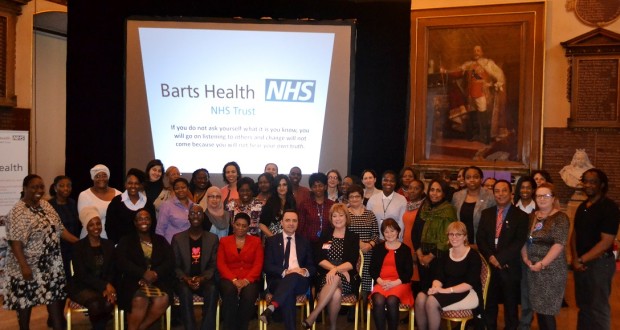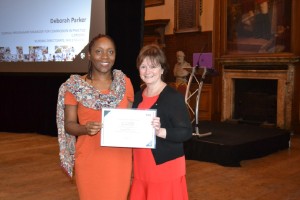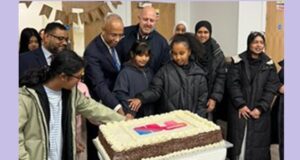Caroline Alexander, Chief Nurse for NHS England (London) described Barts Health as a “role model for other NHS organisations” at a recent celebration event at The Great Hall of St Bartholomew’s Hospital (pictured above). What had the Trust done to achieve this accolade?
The organisation’s own research shows that people from a BME background are more likely to be working in lower paid positions than white people. They are also less likely to gain promotion through an interview process. BME women are doubly-hit, with a disproportionate number of women in senior roles even though they make up three-quarters of the workforce.
Specific findings of the research included the following.
•Fifty per cent of staff in the lowest-paid positions are BME, compared to 20% among the highest pay brackets (band 8+, £39,632 minimum).
•Sixty-four per cent of women are employed at band 8 or above, although the Trust overwhelmingly employs more women (75%) than men (25%).
•Forty per cent of BME staff believe the Trust does not provide equal opportunities for career progression, compared to 20% of white staff.
So far, so not really rocket science – but what did the Trust do? It has set up a programme to increase the confidence, aspirations and attainment of female and BME staff at the east London Trust so its leadership can be more representative of the workforce and local community.
Since June 59 people have undertaken the programme. Twenty-seven were clinical and 32 worked in administration; 54 identified themselves as of Black Minority Ethnic background and five as white; 57 were female and two male. Six of the participants secured promotions or secondments into senior positions and others overcame psychological barriers to achieve life-long aspirations such as passing their driving test.
Is this enough? Karlene Akindele, the project lead, said: “It is possible that a culture of negative behaviours and unconscious bias is influencing the recruitment process as well as demotivating staff and affecting their aspirations. To tackle this, we are making every effort to change our culture by embracing diversity. Ensuring we recruit and retain the best possible staff is the best way to ensure we provide safe care to the people of east London.”
Walburgh Manhungira, midwifery team leader at Barking Birth Centre, said: “Since attending the course in July I am now happier, more confident and ready to enjoy my success. Improvements begin with us but impact positively on everyone. A smiley midwife encourages women to talk about any concerns, and they say ‘I hope to see you again next time’.”
A journey around the world begins with a single step, but we have to hope that now that Barts has taken its first step it gets a bit of a move on.
•Recognition that there is institutional racism in the public sector came into the mainstream in the 1980s, and the NHS should not be wasting time re-inventing the wheel.
•Fifty-nine staff have taken part in the course – but the Trust employs 14,000 staff. At this rate, it will take nearly 150 years for every member of staff to attend.
•Barts serves an East London community of 2.5 million people and aims for its leadership to be “more representative of the workforce and local community”. Any change on such a scale must start in the community: ensuring that school pupils receive the information, motivation and support to gain appropriate qualifications for a medical career.
Unfortunately, in these times of austerity, it will be hard for any hospital trust to find the time and resources to invest in this developmental work. As ever, when funding is tight, diversity will be the first funding head to be cut – which is why there is so much progress still to make.
[Adverts]
 East London News A Force for the community…
East London News A Force for the community…





